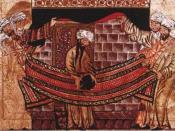5 Pillars of Islam
THE FIVE PILLARS OF ISLAM
Under the Divine Law, otherwise known as Shari'ah, the Five Pillars of Islam are identified. These were told by the Prophet Muhammad and were accepted and followed by all Muslims. The Five Pillars of Islam can be described as Islam's most basic beliefs and practices. Even though these five Pillars are under the religion of Islam there is a variation, not only culturally, but also historically within the Islamic community of believers. These duties are obligatory upon believers. The following is an identification of each of the five pillars and how it relates to the lives of the people who obey them.
SHAHADAH
The first of these pillars is the Shahadah, which expresses that there is only one god (Allah) and that they must recognize Muhammad as his messenger. "There is no god but God, and Muhammad is the messenger of God," is what Muslims musically recite when they are praying (Lippman, 1995, p.
6). Allah is the God of Islam. However, the word Allah was used by Muhammad when he was referring to God, but this God is the same God as the Hebrews and the Christians. The Koran states, "He has knowledge of things. He has ordained for men the faith He has revealed to you and formerly enjoined on Noah and Abraham, on Moses and Jesus, saying, 'Observe this faith and be united in it.'" (Lippman,,1995, p. 7) Muslims believe that God is unique, omniscient, everlasting, omnipresent, living and eternal. Everything occurs and exists because of God. He is the creator of the Earth, the elements, the angels, of men and even the mysterious creatures known as the jinn, which is described as a duplicate of man that has evil inside it (Lippman, 1995, p. 8).
Though God...



Worth reading
Altough the subject of the essay has already been explored by thousands of scientists, it is always good to try and find a new edge on the matter. The essay more or less simply repeats what is already in the books, but it does so in a nice, relaxing way, with lots of quotations and cleverly constructed sentences.
3 out of 3 people found this comment useful.